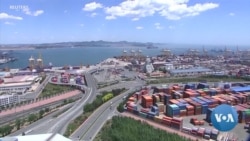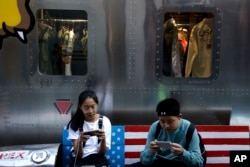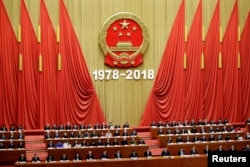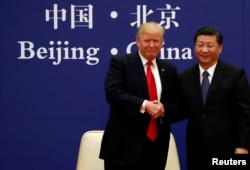During the past year, the United States and China have clashed increasingly over trade, their visions for the world and national security. In 2019, the question of whether the world's two biggest economies can work out a trade deal is something that is set to have an impact not only on their relationship, but the broader Chinese economy as well.
Going forward, the trade war will be a big part of the story because of the uncertainty it creates, noted Scott Kennedy, director of the Project on Chinese Business and Political Economy at the Washington D.C.-based Center for Strategic and International Studies.
"Not because of high tariffs per se, but the effect that it has on Chinese companies' willingness to invest at home and abroad," he said.
Economic crossroads
As 2018 drew to a close, the Chinese economy was at a crossroads. Real estate and retail sales started to falter. Car sales too started to sputter.
The stock market dropped more than 20 percent and the government was taking measures to control unemployment.
Increasingly, some academics and former officials began to question decisions the communist party has made, be it economic policy or the government's approach to the trade dispute with Washington.
Some such as former World Trade Organization negotiator Long Yongtu has knocked the government's decision from the get-go in the trade war — to slap a 25 percent tariff on U.S. soybean imports — calling the decision "unwise" and "ill-thought out."
When the trade tussle with Washington began kicking into gear earlier last year, China repeatedly said that while it did not want a trade war it would fight to the end. There were many who expressed confidence that China would not only fight, but win.
Others are not as sure. In a recent address in Shanghai, senior economist Xiang Songzuo said China needed to reflect on not only the slowing economy and mounting economic pressures, but the trade war and the impact it is having as well.
"We need to reflect on the mistakes we've made. We need to reflect on the future and the real steps that we can take to lift up the economy and help it to truly continue to see stable growth," Xiang said.
My way
As some see it, the choice is simple: Do some heavy lifting and further liberalize or face an even sharper slowdown in economic growth.
China says it wants reform, but on its own terms — a message China's powerful leader Xi Jinping drove home at recent meeting marking 40 years of reform and opening up.
He also had this ominous warning: "Every step in our reform and opening up is not easy. In the future, we will inevitably face all sorts of risks and challenges, even unimaginable tempestuous storms."
No one knows if 90 days will be enough for the U.S. and China to make a deal. At best, analysts said the two sides can hopefully figure out what they can take care of now and what will have to put off for later, but not forever.
Grand bargain
For years, the United States took a patient approach to China, trying to work with Chinese authorities bilaterally and through multilateral institutions to push forward liberalized reform.
Now, that approach has shifted to one that is more impatient and sharper elbowed, analysts note. The approach is pressing China to make big changes in a short amount of time.
President Donald Trump's policies are having an impact on global supply chains that is driving a shift away from China and having an impact on Chinese access to technology as well, said Jerome Cohen, a professor at New York University School of Law.
"We're going to find the danger of China and the U.S. separating economically, and it is going to have a bad impact on both countries, more severe on China than on the United States," Cohen said.
The arrest of high-tech giant Huawei's chief financial officer has added to the complexity of the trade tussle. For now, Washington and Beijing are trying to keep the two issues separate, but clearly, the trade war is about much more than trade.
It's also about assumptions that have long been the foundation of U.S.-China relations, said Kennedy.
"I think the U.S. goal still is to right the ship to find a place where we can interact with each other peacefully on the commercial side while protecting our national security. I don't think the U.S. has decided to give up and say forget it, we can't interact with these folks, we have to have a divorce. It's going to be cold war number two," he said.
For now, whether that happens depends on how the Chinese respond, he added. Going forward, however, deep uncertainty at the commercial and government level will continue.








